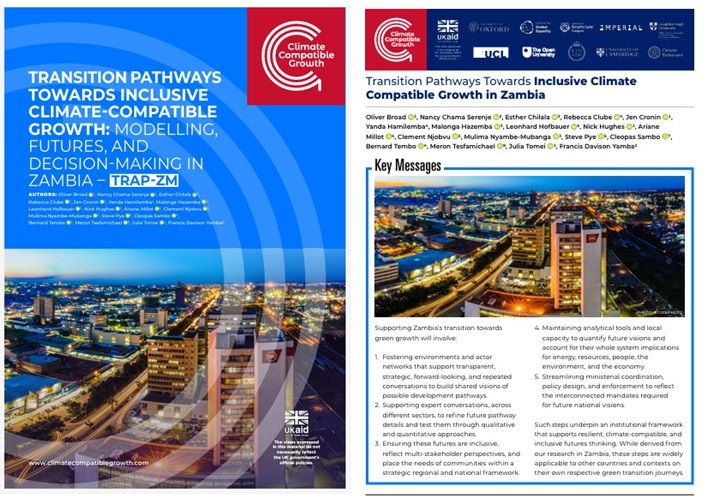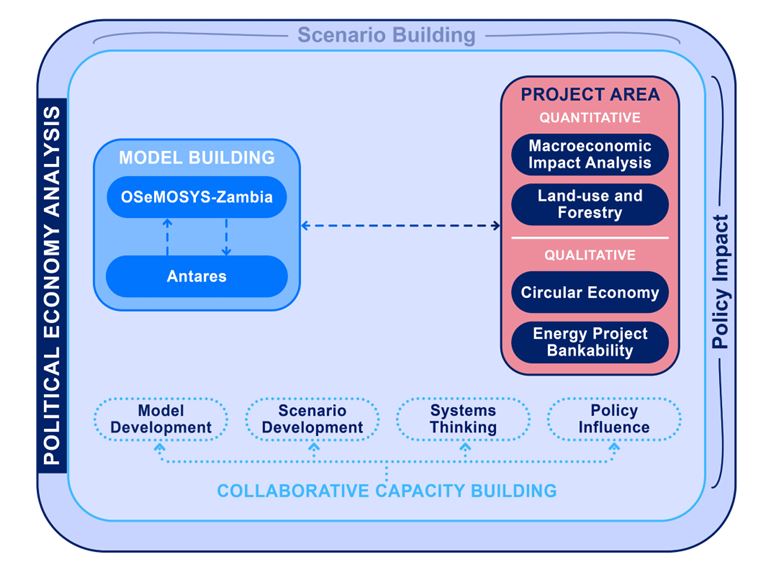NEW POLICY BRIEF: Transition Pathways Towards Inclusive Climate Compatible Growth in Zambia
The authors are: Oliver Broad, Nancy Chama Serenje, Esther Chilala, Rebecca Clube, Jen Cronin, Yanda Hamilemba, Malonga Hazemba, Leonhard Hofbauer, Nick Hughes, Ariane Millot, Clement Njobvu, Mulima Nyambe-Mubanga, Steve Pye, Cleopas Sambo, Bernard Tembo, Meron Tesfamichael, Julia Tomei, and Francis Davison Yamba.

This Policy Brief is the latest addition to CCG’s work as part of the TRAP-ZM project (Transition Pathways towards inclusive climate compatible growth in Zambia). The project aims to address the fact that Zambia’s ambition to create inclusive and sustainable growth continues to face diverse but interconnected social, environmental, and economic challenges. These include high levels of poverty and inequality, debt burden, growing pressures on natural resources, and the lasting legacy of COVID-19.
The Brief outlines how a multi-methods research approach was successfully applied in the Zambian context. The approach helped build local capacity while also providing critical evidence that can be used to support inclusive planning for sustainable growth. In particular, the following lessons emerged:
- Scenario-based approaches can form a solid basis for strategy development;
- Qualitative methods provide essential context, insights, and framing to analytical approaches; and,
- Modelling approaches can support whole systems thinking and provide insights into the synergies and trade-offs between different futures.
Combining these methods can help stakeholders to understand the complex interactions between systems, find constructive pathways to desirable futures, and support effective policymaking.
The Key Recommendations are to:
- Foster the development of an institutional framework for futures thinking and analysis.
- Break down silos and ensure inclusive decision-making by bringing together diverse groups of stakeholders.
- Take a whole systems view to further help overcome oversimplification and siloed thinking in policy design.
- Adopt mixed methods approaches to decision-making as a means of embracing complexity.
Co-Author, Steve Pye explains further: This policy brief is based on the multi-year CCG project, TRAP-ZM, whose objective was to support Zambian stakeholders in their vision to transition to a green economy which fosters sustainable and low-carbon development.
Planning such a transition is challenging and multi-faceted and it required the project to undertake different types of research activities to support such efforts. In partnership with ZIPAR and Tec Analytics, these activities included –
- Participatory scenario development with stakeholders to co-design different visions of sustainable futures in Zambia, with a focus on energy system and land-use implications.
- Model development and capacity building, to assess the energy system implications of such futures, and on the economy and land-use.
- Policy influence training to respond to the need for diverse technical experts to engage with the policy process.

The outputs of the project provide strong research capacity in-country on approaches to exploring different futures, assessing the implications of those futures, and on engagement approaches to land research insights with policy makers.
Key learning points have also emerged:
- the benefits of an inclusive stakeholder approach that brings together a range of perspectives
- the need for a whole systems approach to avoid siloed insights
- the importance of mixed methods (both quantitative and qualitative) to strengthen insights
- and the need for institutional support for the capacity developed.
Bernard Tembo from Tec Analytics, a key partner in the project, commented on the importance of the research stating: “This project provides robust evidence and insights that will support Zambian efforts to plan how to meet their development objectives.”
You can read the full Policy Brief here.
The larger report on which this Policy Brief is based, can be found here.